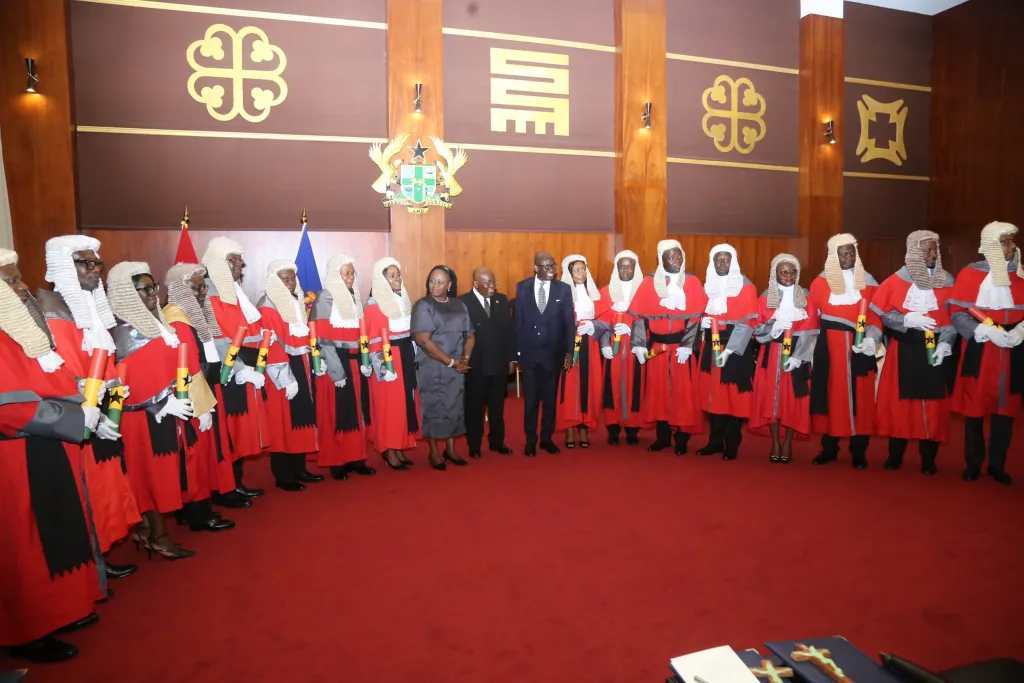The decision to pursue a judicial career is frequently made at different stages in an individual’s life. Irrespective of when this decision is made, one critical factor that girds it is the individual’s passion for justice.
Initially, the decision may arise prior to entering law school, as one recognizes that an aspiration to become a judge necessitates prior qualification and experience as a lawyer.[1] The second stage occurs during law school when students gain a more comprehensive understanding of the various roles within the legal profession and decide which role best suits them.
The third stage may transpire years after law school when individuals assess their career prospects and contemplate the stability of a regular income versus the unpredictable earnings associated with private legal practice or when their zeal for justice delivery takes prime stage over all other considerations.
At each of these decision-making stages, a central consideration for both the individual and the Ghanaian public is the recognition that the role of a judge is a prestigious position that commands significant respect and admiration within society. This societal perception inherently suggests that judicial service is a commendable profession to pursue.
However, the responsibilities accompanying a judgeship extend far beyond merely attaining a reputable status. The role encompasses substantial obligations, necessitates considerable personal sacrifices, and demands an inner resolve characterized by will, purpose, and a level of leadership that may surpass one’s initial expectations.
The secluded nature of judicial work, which often compels judges to adopt a hermetic lifestyle, coupled with the limited number of judges in Ghana,[2] has resulted in a dearth of literature that explores the experiences and realities of judges in the country.
This article seeks to examine the intricacies of the daily life and expectations of a judge, thereby providing valuable insights and potential reflections for individuals contemplating a career on the bench. It is important to clarify that this article does not aim to either inspire or deter prospective judges. Rather, it serves to, as said in the colloquial Ghanaian expression, “lay the facts on the ground bare” and facilitate informed decision-making regarding the pursuit of judicial office.
The article is in two parts. This first part analyzes the general processes applicable to all individuals who assume the role of judges, while the second part, to be published later, will explore the challenges that may be specific to certain judges, though not universally experienced by all. The article intentionally minimizes legal jargon and references to ensure accessibility for a broad audience.
PART ONE
RECRUITMENT PROCESS
In accordance with the Judicial Service Act,[3] recruitment into the judiciary in Ghana occurs through the advertisement of vacant positions. Available positions for application include Magistrate, Circuit Court Judge, and High Court Judge, contingent upon the fulfillment of specified criteria by the applicant. The recruitment process for the Supreme Court and the Court of Appeal does not permit open applications.
Applications are submitted to the Judicial Secretary. Historically, all applicants were required to undertake examinations, the first of which assessed their knowledge of the law, while the second evaluated their proficiency in basic IT skills, including Microsoft Word and Excel. Applicants who achieved the passing score were then invited for an interview. Those who successfully navigated the interview process were appointed as magistrates or judges, after a security clearance.
Currently, there is no written examination for judicial appointments. Following the application process, candidates are shortlisted based on the fulfillment of several criteria. While certain criteria, such as years at the bar, are fixed, others, including presence in the jurisdiction at the time of application, are subject to the discretion of the Judicial Council. Upon being shortlisted, candidates are invited for an interview. The Judiciary does not typically contact individuals who have not been shortlisted for an interview.
Interviews are conducted by a panel consisting of at least five members from the appointments committee. This panel typically includes representatives from the Judicial Council and is comprised of a Supreme Court Judge, the Attorney General or his deputy, the Judicial Secretary, a government appointee, the President of the Ghana Bar Association or the immediate past President, and the Editor of the Council for Law Reporting. Additionally, a retired superior court judge is usually included in the panel.
Following the interviews, successful candidates are sworn into office by either the Chief Justice, for Circuit Court Judges and Magistrates who comprise the lower bench, or by the President of the Republic of Ghana for High Court Judges who are part of the Superior Courts. They are required to take the Oath of Allegiance, the Judicial Oath, and the Oath of Secrecy.
Subsequently, the Judicial Training Institute (JTI) initiates an induction training program for the newly appointed judges or magistrates. This training encompasses both procedural and substantive functions of judges, lasting between one and two weeks. After this, the judges or magistrates are attached to courts for practical training under sitting judges or magistrates. The duration of this attachment is not set in stone. It may be any time from one week to one month. Upon completion of this training, the new judges are assigned to their respective courts to commence their duties.
CONDITIONS OF SERVICE
The conditions of service for a judge or magistrate are outlined in the appointment letter. The compensation and benefits for High Court Judges are delineated in Article 71 of the 1992 Constitution, while those applicable to judges of lower courts are governed by CAP 30.[4]
Like other public servants, salaries and certain allowances are disbursed through the Controller General at the end of each month. It is customary to expect the first salary payment at least three months following the completion of all required formalities. This delay is not unique to judges; nearly all public servants experience significant delays in salary processing upon entering public service.
Some allowances are disbursed directly through the Judicial Service quarterly and may remain unpaid for an extended duration, sometimes up to a year. In extreme circumstances, and subject to the availability of funds, the Judiciary may provide a salary advance equivalent to one month’s salary. Therefore, it is advisable to be prepared to rely on personal financial resources for a period following your swearing-in as a judge.
POSTINGS
Individuals contemplating a career on the bench must consider carefully whether they are prepared and willing to work in any region of Ghana. This is particularly pertinent as, aside from the Supreme Court, which convenes exclusively in Accra, and the Court of Appeal, which operates in the Western, Greater Accra, Eastern, Ashanti, and Northern Regions, all other judges and magistrates may be assigned to any location in Ghana where a court exists. A posting refers to the initial station (place of work) to which judges or magistrates are directed after their appointment.
There are currently 129 High Courts, 102 Circuit Courts, and 231 District Courts located across the 16 regions of Ghana. Consequently, appointees may be assigned to work in any of these locations. Moreover, as part of the application process for judicial positions, candidates must sign a form indicating their willingness to accept postings to any part of Ghana.
This consideration necessitates careful deliberation for individuals with families, particularly those with young children. Will your spouse and children relocate with you to your assigned station, thereby allowing your family unit to remain intact? How adaptable is your spouse’s employment to accommodate such relocations? How would your children’s educational opportunities be affected in various regions of the country? If relocation is not feasible, can your family life sustain the challenges posed by living separately?
Will you be the one visiting, or will your spouse and children travel to see you? Which parent will be responsible for childcare during your absence? How will the management of the primary residence be handled while you are away? What are the potential impacts of your absence on family dynamics, and what strategies do you intend to implement to mitigate these effects? Such inquiries, among others, deserve thorough contemplation before making a decision.
TRANSFERS
As a judge, you are considered a public servant. Consequently, and similar to postings as discussed above, it is expected that you will be transferred to various locations in Ghana throughout your tenure. Within the context of the Judiciary, a transfer refers to a change in the location of one’s office, that is, the court. As the head of the Judiciary, the Chief Justice possesses the authority to assign you to any part of the country.
Thus, you may be transferred from Dambai to Sefwi Wiawso, provided that there are corresponding courts in these locations. If you hold the position of a Court or Circuit Court judge , you may also be assigned to areas with a circuit court or a district court to serve as an additional circuit court judge or magistrate.
Although the Public Service Human Resource Management Framework and Manual, 2015, stipulate that transfers involving a change in region should occur at least once every five years, with reasonable notice provided to the employee involved and consideration given to the academic calendar of employees with children, there are numerous instances where a Chief Justice may transfer an employee within less than a year of their initial posting or transfer, if deemed appropriate. In such cases, the employee may receive less than a month’s notice to relocate to the new station.
Furthermore, although the same Human Resource Management Framework and Manual specifies that transfers should not serve as a form of punishment, there have been occasions where, following a disciplinary hearing, a committee may recommend a transfer, which the Judicial Council may subsequently accept. In these instances, the judge or magistrate involved would be transferred immediately with minimal notice.
On the provisions regarding transfers, it is advisable for prospective judges to thoroughly consider the implications of postings and transfers before making a final decision to join the bench. Postings and transfers can significantly impact various aspects of one’s life, including social interactions.
For individuals who appreciate adventure through exploring new places and acquiring knowledge about diverse cultures, such opportunities may prove to be a suitable fit. They would have the chance to reside in a new region for approximately five years, an adequate duration to engage in exploration. However, they must carefully weigh the effects of such decisions on their families, friends, religious commitments, and other daily engagements common among Ghanaians.
The impact of postings and transfers has prompted many judges to reconsider their decision to pursue a judicial career. Prospective judges should remain cognizant of this factor before making a commitment, as becoming a judge is often viewed as a lifelong vocation.
ABILITY TO FUNCTION EFFECTIVELY IN EXTREME CONDITIONS
The dire condition of certain Ghanaian courtrooms is well-documented. Numerous media reports highlight the deplorable state of some court facilities, and recently, former Chief Justice Sophia Akuffo had to close several courts due to safety concerns arising from the use of hazardous materials, such as asbestos, in their construction.
A notable media report indicated that a magistrate in a court in the Central Region resorted to urinating in a ‘chamber pot’ owing to the absence of toilet facilities. Additionally, reports commissioned by the Judicial Service and presented at the 2021 Chief Justice Forum recommended the immediate closure of a particular court due to its intolerable conditions.
These findings underscore the extreme circumstances under which judges are sometimes compelled to operate. However, it is important to note that this situation is not uniform across all courts in the country. Many courts throughout the country are adequately equipped and offer a safe and conducive environment for judges, judicial staff, lawyers, and court users.
As individuals seeking to join the judiciary cannot choose their posting, they must mentally prepare themselves for the possibility of working in such substandard environments. Without this mental preparation, individuals may experience shock and struggle to reconcile their expectations with the prevailing realities, especially if they have previously been employed in well-maintained facilities.
LEADERSHIP SKILLS
Every court is equipped with a registry, which is administratively supervised by a registrar; however, the judge retains overall authority within the court that they preside over. A judge must possess the ability to command not only the courtroom but also the registry.
The registry is supported by various personnel, including clerks, recorders, interpreters, cashiers, bailiffs, docket clerks, cleaners, and security staff. Clerks, interpreters, and recorders interact directly with the court during proceedings, establishing daily contact with the judge. The remaining staff members are crucial in ensuring the court’s operations are efficient, effective, and timely.
Judicial efficiency hinges on the successful collaboration of all involved parties, as each actor must perform their duties competently for the judge to exercise effectiveness. For example, if the bailiff fails to serve filed processes promptly, the judge cannot proceed on a case, leading to delays and numerous adjournments.
Such adjournments can frustrate court users and legal practitioners, ultimately harming the public perception of the judiciary. This, in turn, diminishes public confidence in the judiciary’s capacity to resolve disputes on time.
To be effective, a judge must possess essential leadership skills that facilitate collaboration with supporting staff, enabling them to perform at their best. Without these skills, the judge may encounter frustration. Leadership skills include effective communication, which allows the judge to articulate the court’s vision for the efficient administration of justice while garnering staff support to achieve this objective.
Given the inherent potential for conflict among individuals, a judge must also possess conflict management skills to address the interpersonal challenges that may arise in a shared environment. The judge should be approachable and maintain a willingness to listen while upholding professionalism, decorum, and appropriate boundaries to avoid being drawn into office conflicts.
Moreover, a judge must exemplify appropriate conduct by leading through example. This includes punctuality, dressing professionally, personal cleanliness, and respect for staff and court users. Consistency in actions and gestures, impartiality, respect for the authority and position of the registrar, minimal and relevant interference and adherence to the code of ethics, and the embodiment of high moral character and integrity are essential leadership qualities that a judge must either possess or cultivate.
EXCLUSIVITY
An individual aspiring to become a judge must recognize that upon being sworn in, they are prohibited from engaging in any other pursuits, whether or not those pursuits are compensated.
Aside from serving as a teacher or lecturer, typically in the field of law, and only with the explicit permission of the Chief Justice, a judge may also engage in subsistence agricultural activities. Beyond these two exceptions, a judge’s sole responsibility is to fulfil the role of a judge, without participating in any other endeavours.
Furthermore, a judge may only serve as a member of a board with the knowledge and/or permission of the Chief Justice and must abstain from all activities that could suggest bias or prejudice toward any institution or organization.
The statements and actions of a judge can be scrutinized at any time for potential judicial impropriety, bias, or prejudice. Consequently, it is advisable for judges to limit their social engagements, particularly on social media and to encourage their immediate family members to do the same, as the actions and statements of family members may also reflect on the judge.
CONCLUSION
The issues outlined in this article, the first of a two-part series, are pertinent to all judges in Ghana and must receive careful evaluation by individuals contemplating a judicial career. It is advantageous for prospective judges to be cognizant of these issues prior to their appointment, as this will enable them to make informed decisions that are free from regret.
For the family and friends of prospective judges, understanding these considerations may, hopefully, facilitate their ability to provide appropriate support during and after this decision-making process.
The second and final part of this paper will address concerns that critically examine a judge’s personal values and principles, as well as the societal and political pressures they may be confronted with while serving on the bench.
While some judges may encounter all of these challenges, others may experience only a subset or none at all. These issues will be explored in greater depth in Part Two of the article.
* The writer is a judge and an alumna of Harvard Law School. Aniagyeiakua@gmail.com.
[1] This has not always been the case. Ghana’s Judiciary instituted a Career Magistrate’s Programme in 2003 to train non-lawyers to fill vacancies in the District Courts. See https://www.ghanaweb.com/GhanaHomePage/NewsArchive/Law-School-to-train-Career-Magistrates-41093. Website was last visited on 28th December, 2024 at 9:16 pm.
[2] Currently, there are 443 serving judges and magistrates in Ghana – see Judicial Service Diary of 2025.
[3]1960, C.A 10
[4] Pensions Act, 1952.
[5] Supra note 2
[6] https://www.graphic.com.gh/news/general-news/chief-justice-bemoans-state-of-courts-as-kasoa-court-uses-chamber-pot.html. Website last visited on 6th January, 2025 at 10:55 am
[7] https://www.soireenews.com/suhum-magistrate-court-must-be-shut-down-researcher. Website last visited on 6th January, 2025 at 11:08am




